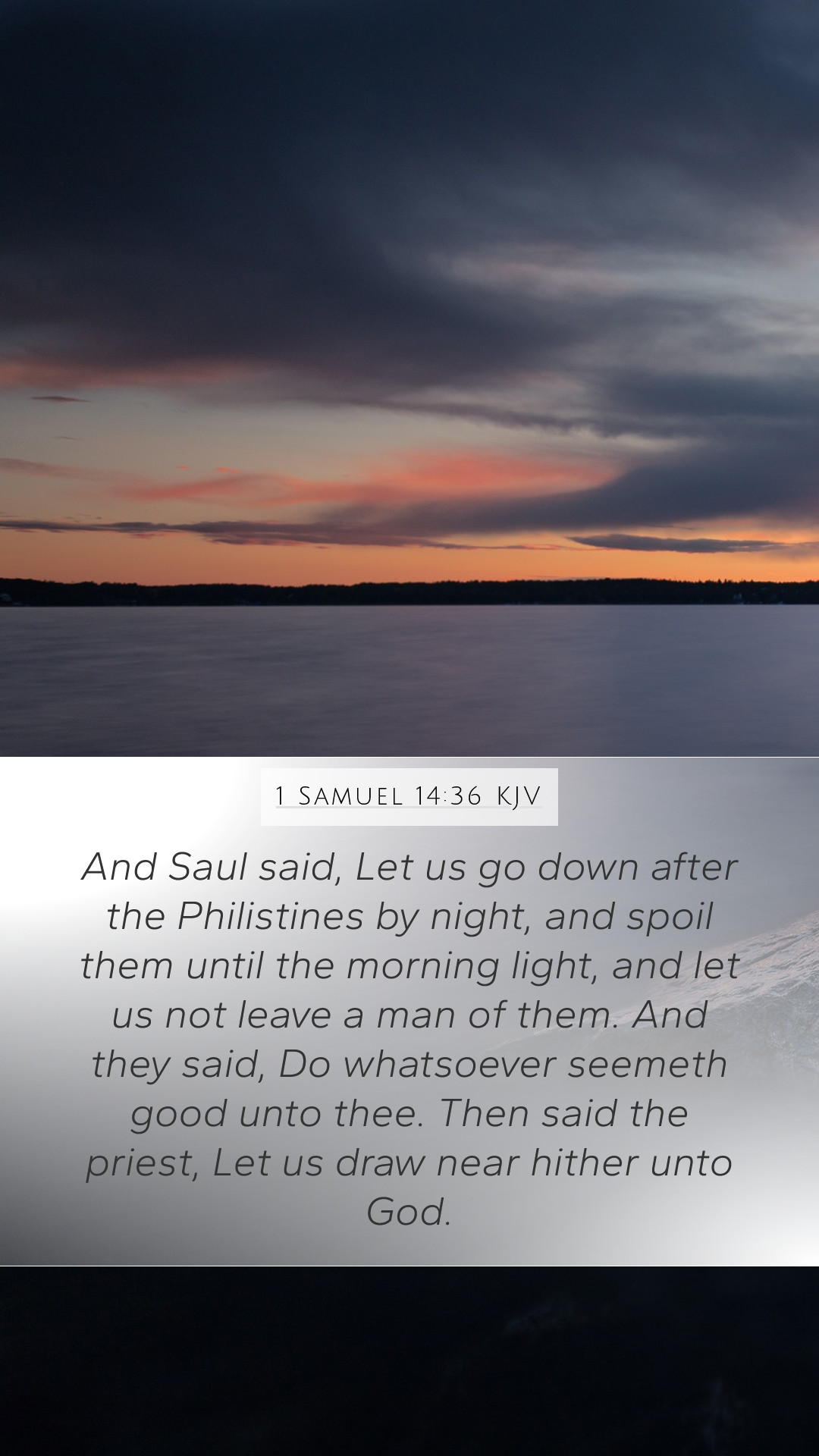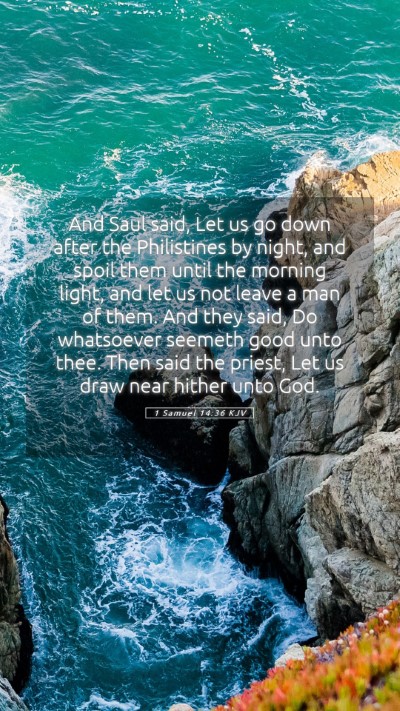Bible Verse Commentary: 1 Samuel 14:36
Verse: 1 Samuel 14:36 - "And Saul said, Let us go down after the Philistines by night, and spoil them until the morning light: and let us not leave a man of them."
Introduction to 1 Samuel 14:36
This verse is part of a larger narrative detailing King Saul’s military strategy against the Philistines. Saul is seen here as he responds to the victory granted by God, driven by a desire to pursue the enemy relentlessly. The dynamics of leadership, divine guidance, and military prudence are central themes in this passage.
Bible Verse Meanings and Interpretations
Understanding this verse requires examining several layers of context and intention behind Saul's actions. The verse exemplifies the resolve to take immediate action against adversaries, a quality admired in leaders. Yet, this also reveals the tension between human initiative and divine approval.
Commentary Insights
-
Matthew Henry: Henry emphasizes that Saul’s urgency shows a mixed spirit—ambition and a desire for glory may overshadow his obedience to divine instruction. Saul appears to seek continual guidance from God yet often acts impetuously, leading Israel into challenges.
-
Albert Barnes: Barnes draws the reader’s attention to the implications of Saul’s plan. He suggests that while the action signifies boldness, it may also indicate a lack of thorough discernment. Barnes indicates this was a moment of high stakes where careful counsel could have produced different outcomes.
-
Adam Clarke: Clarke provides historical context, highlighting the Philistines' threat at this period. He underscores the urgency of the moment, portraying Saul's proposition as one reflecting a traditional warfare mindset without spiritual oversight and the potential perils of acting without consulting God adequately.
Understanding the Historical Context
This verse occurs during a time of significant conflict in Israel's history, wherein external threats like the Philistines posed continuous challenges. Saul, as the king, carries the responsibility for Israel’s security, and thus his decisions are central to the narrative. The urgency implied in his words reflects the intense pressure of his role.
The Dynamics of Leadership
Saul’s leadership style is marked by impetuousness. The lack of deliberation in his command raises questions about his ability to govern effectively. Contrast this chapter with later events, illustrating his declining relationship with God, which becomes vital in the ongoing narrative of Saul’s kingship and his ultimate downfall.
Scriptural Applications
The principles derived from this verse have profound implications for contemporary readers. It raises questions about the importance of divine guidance in decision-making and the necessity of balancing human initiative with spiritual alignment.
Lessons for Today's Believers
- Seeking Divine Guidance: Just as Saul should have sought confirmation through prayer or consultation with the prophet, modern believers are reminded to seek God's will actively in their decisions.
- Assessing Urgency: The pressure of immediate action can often lead believers to make hasty decisions. This verse prompts reflection on the value of patience and discernment.
- Leadership Accountability: Saul’s actions underscore the weight of leadership. Those in positions of influence should strive for wisdom and humility.
Bible Study Insights
For individuals or groups engaging in biblical study, 1 Samuel 14:36 serves as a critical reminder of the need for reflective thinking in leadership decisions. Using this verse as a foundation, group discussions can explore parallel passages and how they resonate with contemporary leadership and personal decision-making.
Cross References
- 1 Samuel 10:8 - Saul is instructed on waiting for divine guidance.
- 1 Samuel 15:34-35 - The consequences of Saul's actions later in his reign.
- Exodus 17:8-13 - Israel’s battles and the reliance on prayer during conflict.
Conclusion
1 Samuel 14:36 encapsulates a pivotal moment in Israel's history, illustrating the complexities of leadership, warfare, and divine relationship. Through examining this scripture, believers can glean significant teachings on decision-making, the importance of seeking God’s guidance, and the implications of hasty leadership actions. This understanding aids the application of biblical principles in everyday life and enhances our understanding of Scripture.


